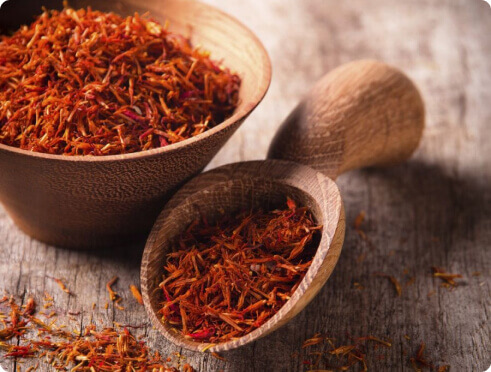Saffron is truly a unique spice. It is valued worldwide not only for its incredible taste and aroma but also for its healing properties. Its popularity is not affected negatively even by its high cost. The latter, by the way, is due to the fact that to obtain just 1000 mg of dried saffron stigma, approximately 150 flowers of this plant are needed.
What makes saffron unique is the fact that it remains entirely untouched by industrialization. Owners of the plantations where this plant grows are compelled to harvest it by hand, just as their ancestors did hundreds and thousands of years ago.
When did people start using saffron?

The medicinal properties of saffron (crocus) have been known since ancient times. In 2004, scientists studying 3500-year-old frescoes on Santorini discovered images of a goddess overseeing the use of a preparation made from the saffron flower.
However, this is not the only ancient reference to the crocus. Images of prehistoric sites in western Iran, dating back approximately 50,000 years, contain saffron pigments. This once again proves that this spice can be considered one of the most ancient known to humanity, dating back from the depths of time.
Against excess weight, depression, and Alzheimer’s disease: saffron in medicine The chemical composition of the crocus contains 150 volatile and aromatic compounds. This unique biochemical combination, which has not yet been fully deciphered, is worth noting. Therefore, it is important to know that saffron is not only a wonderful addition to the flavor of pastries or your favorite paella, but also a powerful therapeutic agent widely used in both official and folk medicine.
Diabetes and excess weight
Recent studies indicate that incorporating such a spice into the diet helps normalize weight. Therefore, dietitians recommend adding saffron to the food of those who want to lose excess body weight, become slimmer, and healthier. And thanks to crocetin, the antioxidant and anti-inflammatory properties of saffron, its intake has a positive effect on the condition of patients with type 2 diabetes, reducing cholesterol levels.
Alzheimer’s disease
Excess weight is not the only issue saffron helps address. There is data suggesting that this unique spice can be used in the comprehensive treatment of serious neurodegenerative diseases such as Alzheimer’s disease.
Evidence of this comes from a randomized double-blind study conducted over 22 weeks in 2010. This study investigated the effect of saffron on patients with Alzheimer’s disease (mild to moderate severity). As a result, it was found that taking 15 mg of saffron twice a day was as effective as taking 5 mg of donepezil (Aricept) twice a day, but with significantly fewer side effects.
This is not the only study that has explored the impact of saffron on patients with Alzheimer’s disease. Another study was conducted in the same year (2010), over 16 weeks, which confirmed that 15 mg of saffron twice a day was safe and effective in treating mild to moderate Alzheimer’s disease.
Depression
Another condition that saffron helps manage is depression. Saffron regulates brain chemicals by stimulating the release of neurotransmitters such as serotonin and dopamine, which can also help with PMS symptoms.
It has been found that saffron petals have the same potential in treating depression as the medication fluoxetine (Prozac). A study on the effects of saffron on patients with depression was conducted in 2007 and published in the journal Progress in Neuropsychopharmacology and Biological Psychiatry. According to the results, 15 mg of saffron petals were as effective as 10 mg of Prozac in treating mild to moderate depression, with complete remission observed in 25% of patients.
Research on the effects of saffron on depression treatment was conducted earlier, in 2004. It demonstrated that 30 mg of saffron per day was as effective as 100 mg of imipramine in treating mild to moderate depression.
Vision
Saffron positively affects eye health as it contains vitamins from the B group, carotenoids (such as crocin), and antioxidants that help neutralize free radicals in the body.
Improving Sleep
“From ancient times, warm milk with a pinch of saffron has been used to induce deep and restful sleep. Some modern individuals still rely on this age-old method. Scientists attribute the mild sedative effect of saffron to the presence of safranal in its chemical composition, which is also a natural analgesic.
When it comes to colds and coughs
Thanks to its gentle expectorant action, saffron accelerates recovery from coughs, easing their symptoms.
For heart health, hair, and skin
Saffron contains a whole complex of vitamins and minerals: manganese, iron, potassium. They not only positively affect the condition of hair and skin but also improve the functioning of the cardiovascular system.
Експериментально підтверджені лікувальні властивості крокусу: повний перелік
The therapeutic properties of saffron have been experimentally confirmed. It has a positive effect on the patient’s condition in such diseases as:
- anxiety disorders;
- asthenozoospermia (low sperm motility);
- cardiac hypertrophy;
- hepatotoxicity due to chemotherapy;
- colon cancer;
- diabetic neuropathy;
- dysmenorrhea;
- erectile dysfunction;
- hypertension;
- inflammatory processes in the body;
- liver cancer;
- occlusion of the middle cerebral artery;
- multiple sclerosis;
- opioid addiction;
- pancreatic cancer;
- psoriasis;
- respiratory diseases;
- wounds and cuts.
The therapeutic effect in the treatment of the mentioned diseases is due to the following pharmacological actions of saffron:
- anxiolytic;
- anti-inflammatory;
- anticancer;
- antidepressant;
- antimutagenic;
- antioxidant;
- antiproliferative;
- aphrodisiac;
- apoptotic;
- sedative and tranquilizing;
- prostaglandin receptor antagonist;
- neuroprotective.
However, remember: when taking saffron, as with any plant, you need to be careful. Be sure to consult a doctor before starting to use saffron for medicinal purposes.
